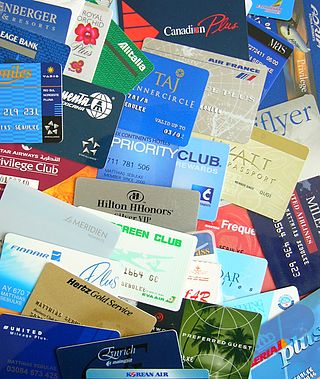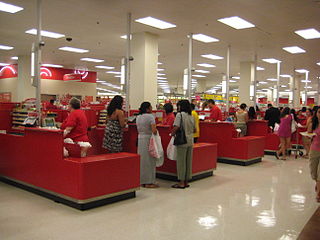
A debit card, also known as a check card or bank card, is a payment card that can be used in place of cash to make purchases. The card usually consists of the bank's name, a card number, the cardholder's name, and an expiration date, on either the front or the back. Many of the new cards now have a chip on them, which allows people to use their card by touch (contactless), or by inserting the card and keying in a PIN as with swiping the magnetic stripe. These are similar to a credit card, but unlike a credit card, the money for the purchase must be in the cardholder's bank account at the time of the purchase and is immediately transferred directly from that account to the merchant's account to pay for the purchase.

A loyalty program is a marketing strategy designed to encourage customers to continue to shop at or use the services of a business associated with the program. A loyalty program typically involves the operator of a particular program set up an account for a customer of a business associated with the scheme, and then issue to the customer a loyalty card which may be a plastic or paper card, visually similar to a credit card, that identifies the cardholder as a participant in the program. Cards may have a barcode or magstripe to more easily allow for scanning, although some are chip cards or proximity cards.

A supermarket is a self-service shop offering a wide variety of food, beverages and household products, organized into sections. This kind of store is larger and has a wider selection than earlier grocery stores, but is smaller and more limited in the range of merchandise than a hypermarket or big-box market. In everyday United States usage, however, "grocery store" is often used to mean "supermarket".

The point of sale (POS) or point of purchase (POP) is the time and place at which a retail transaction is completed. At the point of sale, the merchant calculates the amount owed by the customer, indicates that amount, may prepare an invoice for the customer, and indicates the options for the customer to make payment. It is also the point at which a customer makes a payment to the merchant in exchange for goods or after provision of a service. After receiving payment, the merchant may issue a receipt for the transaction, which is usually printed but can also be dispensed with or sent electronically.

Financial services are economic services tied to finance provided by financial institutions. Financial services encompass a broad range of service sector activities, especially as concerns financial management and consumer finance.

A private label, also called a private brand or private-label brand, is a brand owned by a company, offered by that company alongside and competing with brands from other businesses. A private-label brand is almost always offered exclusively by the firm that owns it, although in rare instances the brand is licensed to another company. The term often describes products, but can also encompass services.

President's Choice Financial, commonly shortened to PC Financial, is the financial service brand of the Canadian supermarket chain Loblaw Companies.
Generic brands of consumer products are distinguished by the absence of a brand name, instead identified solely by product characteristics and identified by plain, usually black-and-white packaging. Generally they imitate more expensive branded products, competing on price. They are similar to "store brand" or "private label" products sold under a brand particular to the merchant, but typically priced lower and perceived as lower quality. The term off brand is sometimes used. In the United Kingdom, these products are often referred to as "own brand" items.

Woolworths Supermarkets is an Australian chain of supermarkets and grocery stores owned by Woolworths Group. Founded in 1924, Woolworths today is Australia's biggest supermarket chain with a market share of 33% as of 2019.
Merchant Account Providers give businesses the ability to accept debit and credit cards in payment for goods and services. This can be face-to-face, on the telephone, or over the internet.
An order management system, or OMS, is a computer software system used in a number of industries for order entry and processing.

A fuel card or fleet card is used as a payment card most commonly for gasoline, diesel, and other fuels at gas stations. Fleet cards can also be used to pay for vehicle maintenance and expenses at the discretion of the fleet owner or manager. Most fuel cards are charge cards.
A decoupled debit card is a debit card in the US that is not issued by and not tied to any particular retail financial institution, such as a bank or credit union. This is based on the ability in the US ACH Network payment system to make an electronic payment from any bank or credit union without needing to use a card issued by the bank or credit union. A third party, such as a retailer, can create a decoupled debit card which will use this system to make a payment from the customer's checking account. They may do this as part of a loyalty scheme or to reduce their own debit card processing costs.

Rede known as Redecard is a Brazilian multi-brand acquirer with 25 brands in its portfolio, for credit, debit and benefit cards. Its activities include merchant acquiring, capturing, transmission, processing and settlement of credit and debit card transactions, prepayment of receivables to merchants, rental of POS terminals, check verification through POS terminals, credit card machine and the capture and transmission of transactions using benefit-voucher, private-label cards and loyalty programs such as Multiplus. The company is the first largest in its sector. The company was traded in BM&F Bovespa and disclosed in 2012, 24, September.

SparkBase, LLC was a stored-value and gift card transaction processor located in Cleveland, Ohio, United States from 2004 to 2016. It provided private-label, stored-value, specialty gift cards, customer loyalty, and community rewards programs to Independent Sales Organizations. ISOs then sold these gift and loyalty products to merchant customers along with credit card services and processing equipment.
Data as a service (DaaS) is a cloud-based software tool used for working with data, such as managing data in a data warehouse or analyzing data with business intelligence. It is enabled by software as a service (SaaS). Like all "as a service" (aaS) technology, DaaS builds on the concept that its data product can be provided to the user on demand, regardless of geographic or organizational separation between provider and consumer. Service-oriented architecture (SOA) and the widespread use of APIs have rendered the platform on which the data resides as irrelevant.

Richelieu Foods is a private label food manufacturing company founded in 1862, headquartered in Wheeling, IL. It was previously owned by investment group Brynwood Partners and owned from 2010 by investment group Centerview Partners LLC and sold December 2017 to Freiberger USA Inc., Parsippany, New Jersey, USA, a subsidiary of the German Südzucker AG

Hannaford is an American supermarket chain based in Scarborough, Maine. Founded in Portland, Maine, in 1883, Hannaford operates stores in New England and New York. The chain is now part of the Ahold Delhaize group based in the Netherlands, and is a sister company to formerly competing New England supermarket chain Stop & Shop.
U.S. Bankcard Services, Inc. (USBSI) is a provider of merchant services for credit card and other electronic payment transactions. The company is located in City of Industry, California, United States, and serves the United States. US Bankcard Services is an Elavon, Inc. company.

Worldpay, Inc. is an American payment processing company and technology provider. In February 2024, it was separated from Fidelity National Information Services (FIS) to become an independent company once again. It is majority owned by private equity firm GTCR. It is headquartered in the greater Cincinnati, Ohio area. Worldpay, Inc., is the largest U.S. merchant acquirer ranked by general-purpose transaction volume.













